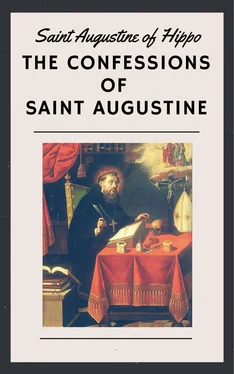Who can disentangle that twisted and intricate knottiness? Foul is it: I hate to think on it, to look on it. But Thee I long for, O Righteousness and Innocency, beautiful and comely to all pure eyes, and of a satisfaction unsating. With Thee is rest entire, and life imperturbable. Whoso enters into Thee, enters into the joy of his Lord: and shall not fear, and shall do excellently in the All-Excellent. I sank away from Thee, and I wandered, O my God, too much astray from Thee my stay, in these days of my youth, and I became to myself a barren land.
To Carthage I came, where there sang all around me in my ears a cauldron of unholy loves. I loved not yet, yet I loved to love, and out of a deep-seated want, I hated myself for wanting not. I sought what I might love, in love with loving, and safety I hated, and a way without snares. For within me was a famine of that inward food, Thyself, my God; yet, through that famine I was not hungered; but was without all longing for incorruptible sustenance, not because filled therewith, but the more empty, the more I loathed it. For this cause my soul was sickly and full of sores, it miserably cast itself forth, desiring to be scraped by the touch of objects of sense. Yet if these had not a soul, they would not be objects of love. To love then, and to be beloved, was sweet to me; but more, when I obtained to enjoy the person I loved, I defiled, therefore, the spring of friendship with the filth of concupiscence, and I beclouded its brightness with the hell of lustfulness; and thus foul and unseemly, I would fain, through exceeding vanity, be fine and courtly. I fell headlong then into the love wherein I longed to be ensnared. My God, my Mercy, with how much gall didst Thou out of Thy great goodness besprinkle for me that sweetness? For I was both beloved, and secretly arrived at the bond of enjoying; and was with joy fettered with sorrow-bringing bonds, that I might be scourged with the iron burning rods of jealousy, and suspicions, and fears, and angers, and quarrels.
Stage-plays also carried me away, full of images of my miseries, and of fuel to my fire. Why is it, that man desires to be made sad, beholding doleful and tragical things, which yet himself would no means suffer? yet he desires as a spectator to feel sorrow at them, and this very sorrow is his pleasure. What is this but a miserable madness? for a man is the more affected with these actions, the less free he is from such affections. Howsoever, when he suffers in his own person, it uses to be styled misery: when he compassionates others, then it is mercy. But what sort of compassion is this for feigned and scenical passions? for the auditor is not called on to relieve, but only to grieve: and he applauds the actor of these fictions the more, the more he grieves. And if the calamities of those persons (whether of old times, or mere fiction) be so acted, that the spectator is not moved to tears, he goes away disgusted and criticising; but if he be moved to passion, he stays intent, and weeps for joy.
Are griefs then too loved? Verily all desire joy. Or whereas no man likes to be miserable, is he yet pleased to be merciful? which because it cannot be without passion, for this reason alone are passions loved? This also springs from that vein of friendship. But whither goes that vein? whither flows it? wherefore runs it into that torrent of pitch bubbling forth those monstrous tides of foul lustfulness, into which it is wilfully changed and transformed, being of its own will precipitated and corrupted from its heavenly clearness? Shall compassion then be put away? by no means. Be griefs then sometimes loved. But beware of uncleanness, O my soul, under the guardianship of my God, the God of our fathers, who is to be praised and exalted above all for ever, beware of uncleanness. For I have not now ceased to pity; but then in the theatres I rejoiced with lovers when they wickedly enjoyed one another, although this was imaginary only in the play. And when they lost one another, as if very compassionate, I sorrowed with them, yet had my delight in both. But now I much more pity him that rejoiceth in his wickedness, than him who is thought to suffer hardship, by missing some pernicious pleasure, and the loss of some miserable felicity. This certainly is the truer mercy, but in it grief delights not. For though he that grieves for the miserable, be commended for his office of charity; yet had he, who is genuinely compassionate, rather there were nothing for him to grieve for. For if good will be ill willed (which can never be), then may he, who truly and sincerely commiserates, wish there might be some miserable, that he might commiserate. Some sorrow may then be allowed, none loved. For thus dost Thou, O Lord God, who lovest souls far more purely than we, and hast more incorruptibly pity on them, yet are wounded with no sorrowfulness. And who is sufficient for these things?
But I, miserable, then loved to grieve, and sought out what to grieve at, when in another's and that feigned and personated misery, that acting best pleased me, and attracted me the most vehemently, which drew tears from me. What marvel that an unhappy sheep, straying from Thy flock, and impatient of Thy keeping, I became infected with a foul disease? And hence the love of griefs; not such as should sink deep into me; for I loved not to suffer, what I loved to look on; but such as upon hearing their fictions should lightly scratch the surface; upon which, as on envenomed nails, followed inflamed swelling, impostumes, and a putrefied sore. My life being such, was it life, O my God?
And Thy faithful mercy hovered over me afar. Upon how grievous iniquities consumed I myself, pursuing a sacrilegious curiosity, that having forsaken Thee, it might bring me to the treacherous abyss, and the beguiling service of devils, to whom I sacrificed my evil actions, and in all these things Thou didst scourge me! I dared even, while Thy solemnities were celebrated within the walls of Thy Church, to desire, and to compass a business deserving death for its fruits, for which Thou scourgedst me with grievous punishments, though nothing to my fault, O Thou my exceeding mercy, my God, my refuge from those terrible destroyers, among whom I wandered with a stiff neck, withdrawing further from Thee, loving mine own ways, and not Thine; loving a vagrant liberty.
Those studies also, which were accounted commendable, had a view to excelling in the courts of litigation; the more bepraised, the craftier. Such is men's blindness, glorying even in their blindness. And now I was chief in the rhetoric school, whereat I joyed proudly, and I swelled with arrogancy, though (Lord, Thou knowest) far quieter and altogether removed from the subvertings of those "Subverters" (for this ill-omened and devilish name was the very badge of gallantry) among whom I lived, with a shameless shame that I was not even as they. With them I lived, and was sometimes delighted with their friendship, whose doings I ever did abhor—i.e., their "subvertings," wherewith they wantonly persecuted the modesty of strangers, which they disturbed by a gratuitous jeering, feeding thereon their malicious birth. Nothing can be liker the very actions of devils than these. What then could they be more truly called than "Subverters"? themselves subverted and altogether perverted first, the deceiving spirits secretly deriding and seducing them, wherein themselves delight to jeer at and deceive others.
Among such as these, in that unsettled age of mine, learned I books of eloquence, wherein I desired to be eminent, out of a damnable and vainglorious end, a joy in human vanity. In the ordinary course of study, I fell upon a certain book of Cicero, whose speech almost all admire, not so his heart. This book of his contains an exhortation to philosophy, and is called "Hortensius." But this book altered my affections, and turned my prayers to Thyself O Lord; and made me have other purposes and desires. Every vain hope at once became worthless to me; and I longed with an incredibly burning desire for an immortality of wisdom, and began now to arise, that I might return to Thee. For not to sharpen my tongue (which thing I seemed to be purchasing with my mother's allowances, in that my nineteenth year, my father being dead two years before), not to sharpen my tongue did I employ that book; nor did it infuse into me its style, but its matter.
Читать дальше












